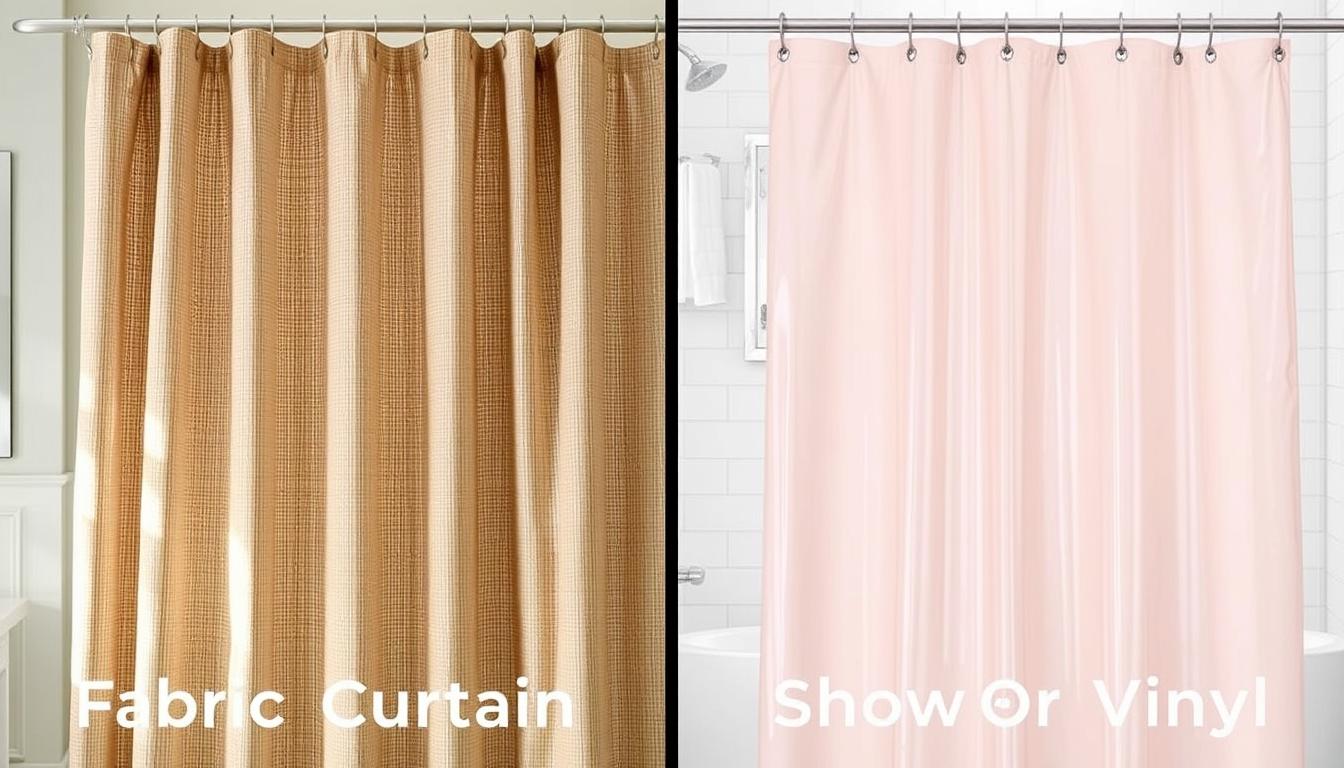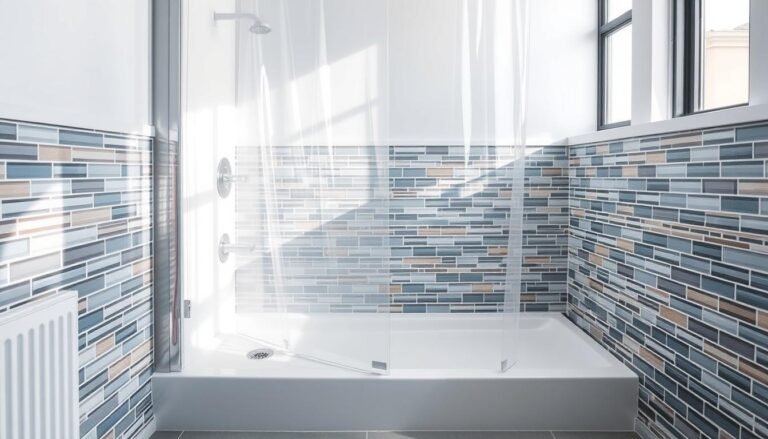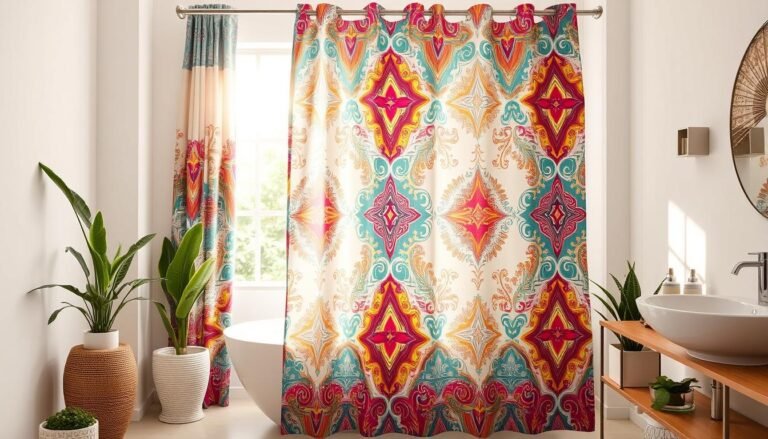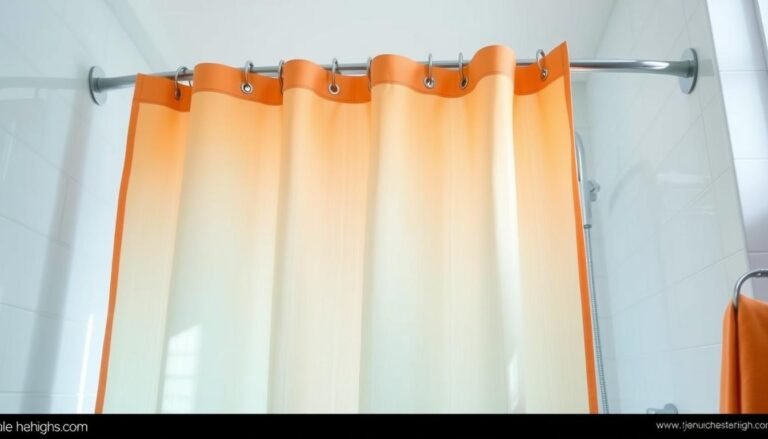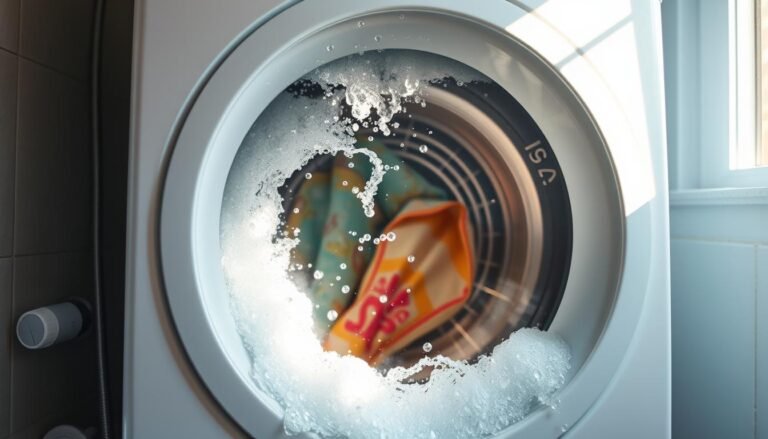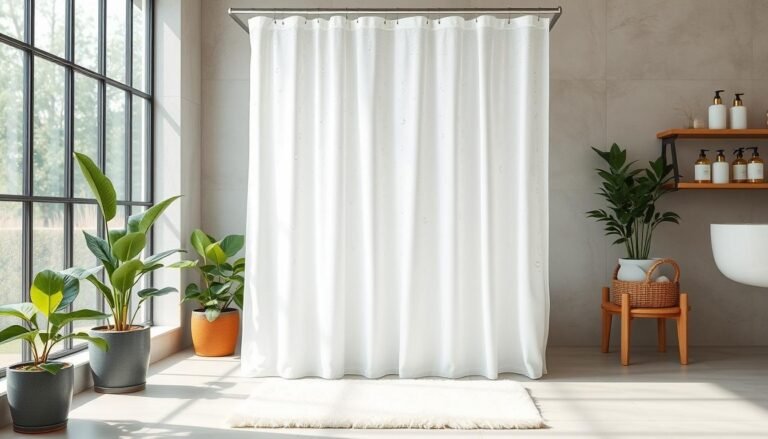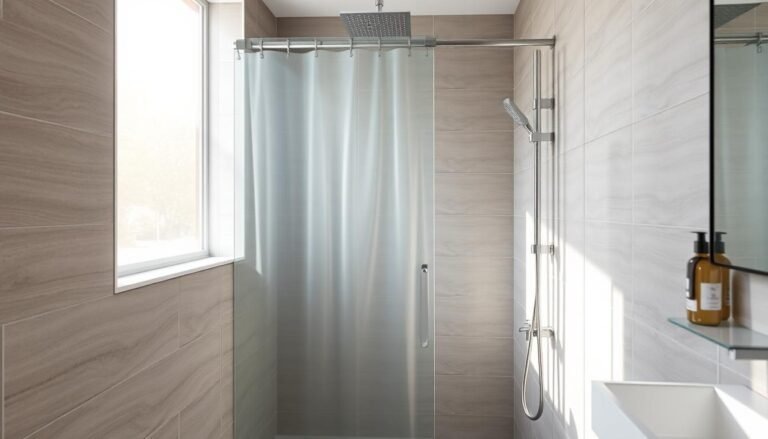Fabric vs. Vinyl Shower Curtains: Key Differences
Choosing the right shower curtain can spark debate between fabric and vinyl options. Knowing the key differences is crucial for your decision. Both have unique benefits that cater to different preferences and requirements.
Fabric shower curtains look more luxurious. They come in various textures like nylon, polyester, and cotton. These curtains are easy to clean because they can go right into the washing machine.
Vinyl shower curtains, however, are known for their affordability. They’re easy to maintain with just a simple wipe. Yet, they can have a downside. Vinyl, especially PVC, might release bad smells. Shoppers now consider PEVA or EVA liners as they are better for the environment.
Whether you choose fabric or vinyl for your shower, think about how you’ll hang it. Some need hooks, while others use grommets or are hookless. This can add a modern look to your bathroom.
The Basic Differences Between Fabric and Vinyl Shower Curtains
When choosing the best shower curtain, it’s key to know the differences between fabric and vinyl. Each type offers unique benefits for different tastes and needs. Here we’ll discuss what sets them apart.
Material Composition
Fabric curtains come in luxurious materials like cotton and polyester. These enhance your bathroom’s look and feel. In contrast, vinyl curtains are mainly made of PVC, PEVA, or EVA. These materials are flexible and last a long time. The curtain’s material affects its appearance, feel, and how it works in your bathroom.
Appearance and Aesthetics
Fabric curtains are often seen as classier and more stylish. They’re available in various textures and designs, adding elegance to your space. For instance, you can find the Madison Park Spa Waffle Shower Curtain or the Serene Faux Silk Embroidered Floral Shower Curtain. These designs come in colors like aqua and blue. Vinyl curtains, though simpler, still offer many colors and patterns. They fit well in bathrooms with a practical, minimalist design.
Water Resistance
Fabric and vinyl shower curtains differ in their water resistance. Vinyl curtains are totally waterproof. This means water slides off easily, stopping mold and mildew from growing. Fabric curtains can repel water too. But, they might soak through if they get too wet or after many washes. The thickness of the curtain liner also matters for keeping water out.
The choice of shower curtain rings can also affect the curtain’s function and look. You can choose rings made of stainless steel, bronze, or plastic. They add different touches of style and practicality to your curtain.
| Aspect | Fabric Shower Curtain | Vinyl Shower Curtain |
|---|---|---|
| Material | Cotton, Polyester | PVC, PEVA, EVA |
| Aesthetics | Stylish, Classy | Practical, Minimalistic |
| Water Resistance | Water-repellent | Waterproof |
Difference Between Fabric and Vinyl Shower Curtain
Choosing between fabric and vinyl shower curtains? It’s important to know their pros and cons. The differences between fabric and vinyl shower curtains are clear. They include durability, health concerns, and how easy they are to keep clean.
Durability and Longevity
How long your shower curtain lasts is key. Fabric curtains are tough. They come in cotton, microfiber, or polyester. For example, polyester ones are waterproof and strong.
Yet, vinyl curtains are cheaper and resist mildew due to their water-proof nature. But, they might not last as long as fabric curtains.
Health Considerations
Health factors matter a lot when choosing curtains. Vinyl ones are easy on the wallet but might release harmful chemicals. This could cause headaches or nausea. Fabric curtains or PEVA ones are better for those who care about health.
Fabric curtains may attract mildew or mold, affecting cleanliness. Look for mildew-resistant options to avoid this problem.
Maintenance and Cleaning
How easy curtains are to clean is crucial in choosing. Vinyl curtains are simple to clean with a wipe. But, washing them in machines is not suggested. This makes them a go-to for easy care.
Fabric curtains look great but need regular machine washing to fight off mold and mildew. Options like the Madison Park Spa Waffle Shower Curtain come treated to repel water. This makes them easier to manage.
| Aspect | Fabric Shower Curtain | Vinyl Shower Curtain |
|---|---|---|
| Durability | High, especially with materials like microfiber and polyester | Moderate, may wear out over time |
| Health Considerations | Healthier, especially with mildew-resistant treatments | Potential off-gassing of toxic chemicals |
| Maintenance | Needs regular machine washing | Easy to clean, typically wiped down |
Pros and Cons of Fabric and Vinyl Shower Curtains
When deciding between fabric and vinyl shower curtains, you need to think about style, upkeep, and how they affect the planet. We’ve compared fabric and vinyl shower curtains to help decide. We cover their pros and cons.
Advantages of Fabric Shower Curtains
Fabric shower curtains add luxury and elevate your bathroom’s look. When comparing fabric to vinyl, fabric stands out for its quality feel.
Aesthetic Value: Fabric curtains offer an elegant style. For instance, The Company Store’s options or the Brooklinen set create an inviting bathroom.
Durability: Fabric curtains can last longer. The Quiet Town Sun Shower Curtain Liner shows fabric’s durability is unmatched.
Washable: You can wash and reuse fabric curtains, which makes them last.
Disadvantages of Fabric Shower Curtains
Fabric shower curtains have some negatives, though.
- Maintenance: Like the Brooklinen set, fabric requires regular washing to avoid mold.
- Susceptibility to Mold: Fabric is more likely to get moldy without care.
- Cost: Some high-quality options, such as the Parachute Turkish Shower Curtain, cost more.
Advantages of Vinyl Shower Curtains
Vinyl shower curtains are liked for quite a few reasons.
- Affordability: Choices like the Gorilla Grip liner are cheap yet durable.
- Ease of Maintenance: Vinyl is simple to clean and needs little care.
- Water Resistance: Their high water resistance means less mold and mildew.
Disadvantages of Vinyl Shower Curtains
But, vinyl curtains have their issues too.
- Environmental Concerns: Many vinyl curtains are bad for the planet, releasing harmful chemicals. PEVA or EVA liners are healthier, as explained on Clean Healthy Living.
- Durability Issues: They may wear out faster than fabric curtains.
- Aesthetic Limitations: Fabric curtains look more upscale than vinyl options.
In the end, choosing between fabric and vinyl depends on what you value most. Consider their strengths and weaknesses to pick what’s best for your bathroom.
Environmental Impact of Fabric and Vinyl Shower Curtains
Choosing the right shower curtain matters for the environment. Vinyl curtains, made from PVC, are tough and keep water in the shower. Yet, they’re not great for the planet. They give off harmful chemicals like VOCs and phthalates, polluting the air inside your home. Making and getting rid of PVC curtains also involves dangerous toxins.
Fabric curtains are a better choice but have issues too. For example, cotton curtains need lots of water and energy to wash regularly. This affects their green score. However, hemp is a more planet-friendly pick. It’s strong, grows easily, and fights against mold without chemicals.
Eco-Friendly Alternatives
If you care about the Earth, think about greener choices for your shower. PEVA and EVA materials are better than PVC. They don’t have chlorine and have fewer harmful airs. PEVA is also waterproof and might not need a second layer. This means using less stuff. PEVA curtains are strong, keep water out, and are less harmful than some plastics. But they still have some environmental issues to think about.
Try organic cotton and hemp for eco-friendly curtains. They let your bathroom breathe and are made in a cleaner way. These choices help cut down harmful effects on nature. Remember to use green soaps and dry the curtains in the sun. Doing these things helps your curtains last longer and be kinder to the planet. For tips on picking the right curtain, check out this guide.

Hey there, I’m Alex Hanson and I’m passionate about all things covers! Whether you’re looking for a car seat cover to protect your vehicle or an oven cover to keep your kitchen clean, I’m here to help. With years of experience in the industry, I have plenty of knowledge and insights to share with my readers. So, if you care about protecting your belongings and making them look their best, you’re encouraged to read my blog as I explore the perfect cover for every need.

